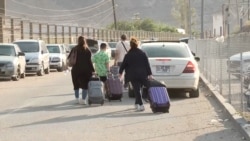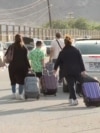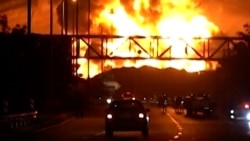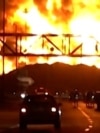AGARAK, Armenia -- With Israeli air strikes showing no sign of slowing after five days, thousands are fleeing Tehran, creating traffic jams and fuel shortages as they head north seeking refuge in parts of the country they hope are safe. For many, that’s not far enough.
Northern border crossings -- Iran shares borders in the region with Turkey and Azerbaijan as well as Armenia -- are being flooded with those seeking to leave Iran fearing no place inside the country is safe.
In Agarak, on the Armenian side of the border with Iran, locals say the usual trickle has become a deluge.
“No city is safe,” Amir Nikki told RFE/RL's Armenian Service, known locally as Radio Azatutyun, “because there are military and [Islamic] Revolutionary Guards [Corps installations] and weapons everywhere.”
Nikki lives in the United Kingdom, but his family resides in the central city of Isfahan, close to the nuclear facilities that Israel says it is targeting in a bid to neutralize Iran’s nuclear program.
Israel, and many of its Western allies, accuse Iran of seeking to build nuclear weapons. Tehran has vehemently rejected the accusations, saying its atomic program is purely for civilian purposes.
Either way, Nikki’s family are caught in the cross fire.
“They are very [anxious]. They are in a stressful situation. They can’t breathe, they can’t eat, they can’t drink. They are in shock. They can’t sleep,” he said after crossing into Armenia more than 1,100 kilometers from Isfahan.
Since Israel launched air strikes at targets across Iran on June 13, both sides have conducted waves of attacks that have hit both military and nonmilitary buildings, leaving scores dead.
But the situation in Iran is considerably worse given Israel’s military advantage.
The violence has pushed the entire Middle East -- already on edge due to Israel's 20-month-long war in Gaza -- to the cusp of all-out war.
Most Iranians crossing into Armenia -- both men and women -- avoided speaking on camera due to fear of possible repercussions from the Islamic regime.
The majority of those escaping Iran appear to be women and elderly people.
At the Agarak checkpoint, Armenian taxi drivers say they have been dealing with the flood of people by working in shifts throughout the day, offering transportation services to those entering the country and needing to go in different directions.
They say it’s not only Iranians crossing the border. Many are citizens of other countries fleeing the war.
Number Of Crossings 'Likely To Grow'
RFE/RL’s Armenian Service correspondents on the ground reported seeing groups of Asian citizens among those entering Armenia.
One predicted that, as the conflict between Israel and Iran continues to escalate, the number of people crossing into Armenia will “likely grow."
Ismail, who asked to withhold his last name, is an Iranian who lives in Germany.
He said he had to make the arduous journey to Agarak because flights out of the country have been canceled for safety reasons.
He’s hopeful the fighting won’t turn into all-out war, fearing how it could affect his relatives still inside Iran.
“I don’t think a war is coming. America and Europe will push for an end [to the hostilities],” he says.
Until then, Ismail says all he can do now that he’s out of the country is stay in touch with his family and hope from afar that they will be safe.















Forum